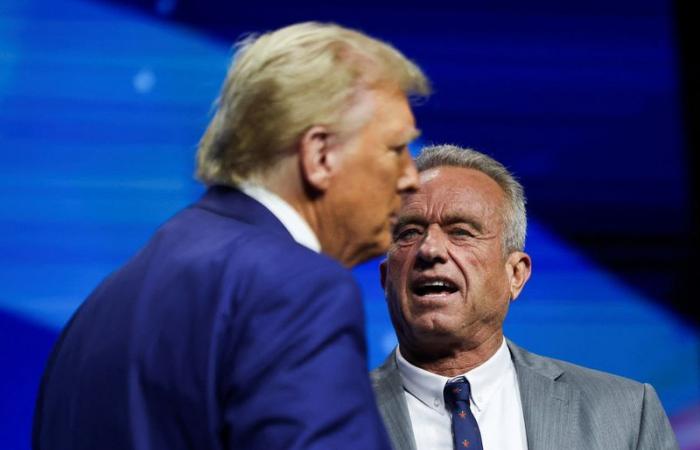The U.S. pharmaceutical industry is pushing to reform the new law that allows Medicare to negotiate prices for the most expensive prescription drugs, according to lobbyists, executives, analysts and health policy experts, once the president elected Donald Trump will be back in power.
Seven lobbyists and executives who work with leading pharmaceutical and biotechnology companies told Reuters they are pushing to delay by four years the date when drugs become eligible for price negotiations for small-molecule drugs, which are mainly pills and represent most medications.
Two sources said the industry was already speaking directly with members of Mr. Trump's transition team.
Medicare's ability to directly negotiate prices for certain drugs for the first time was part of the Inflation Reduction Act, seen as one of the key achievements of outgoing President Joe Biden's administration. Medicare covers 66 million Americans, mostly ages 65 and older.
Since the Inflation Reduction Act was passed in 2022, drugmakers have complained about the terms of Medicare's negotiating powers, saying it would stifle innovation. The government says drug price negotiations will save nearly $25 billion by 2031.
The industry was particularly opposed to the deadline for eligibility for negotiation for most drugs. When drugs have no competition, the law allows the government to negotiate prices for complex biological drugs after 13 years of marketing, but after 9 years for drugs in pill and capsule form.
Pharmaceutical companies said this would dissuade them from developing drugs that are generally cheaper, easier to produce and more convenient for patients, and instead push them to prioritize research into biologic drugs, which are the most often given by infusion rather than taken at home.
Yet four drugmakers involved in early U.S. Medicare negotiations reassured analysts and investors earlier this year that they did not expect a significant impact on their activities after seeing the prices suggested by the government which would come into force in 2026.
S. Sean Tu, a law professor at West Virginia University, called 13-year market exclusivity for all drugs a “terrible idea,” adding that drugmakers would have enough financial incentives to innovate with only five years on the market.
Agreeing to extend the duration of possible price negotiations from 9 to 13 years amounts to “giving a huge boost to the pharmaceutical industry without compensation”, he declared.
WAIT FOR THE REPUBLICANS
A source at a major pharmaceutical company said the company had phone calls and in-person meetings with members of Mr. Trump's transition team to discuss possible changes to the IRA.
The company hopes a Republican Congress and the Trump administration will eliminate the distinction in how the easiest-to-produce drugs are processed.
“They have been receptive,” the source said, declining to say who the company had spoken to on the transition team.
The Trump transition team did not respond to a request for comment.
Mr. Trump nominated industry critic Robert F. Kennedy Jr. to be secretary of the U.S. Department of Health and Human Services, which includes the agency overseeing Medicare and those negotiations.
Drugmakers are betting that Republican lawmakers and the Trump administration will be more open to changing the IRA. A pharmaceutical company executive, who spoke on condition of anonymity, said Republicans also fear the law could hamper the development of non-biotechnology drugs.
“I think Republicans increasingly recognize that the IRA has unintended consequences,” said another drug company executive, speaking on condition of anonymity. “This is not wishful thinking.
Drug companies expect to take advantage of Republicans' push to remove some of the legislation's provisions relating to energy and environmental subsidies, three of the sources said.
In the first round of price negotiations, the Biden administration reduced the amount it will pay for ten widely used Medicare prescription drugs by 79%. It is estimated that this measure will reduce revenues from these drugs by several billion dollars, of which only three are biotechnology drugs.
Besides oral medications, injectable medications such as Novo Nordisk's diabetes treatment Ozempic are considered small molecule drugs and have a shorter market period for negotiated prices. Ozempic, known chemically as semaglutide, is expected to be selected for the next round of Medicare negotiations in February, without changes to the law.
The companies hope to address the law through the budget reconciliation process, one of the industry lobbyists said. This procedure requires only a majority of votes in the Senate, instead of the 60 normally needed, for a measure to pass, and Republicans will hold the majority next year.
A complete repeal of drug price negotiations is unlikely, four industry executives and experts agreed.
Evan Seigerman, an analyst at BMO, suggested that Kennedy could be an obstacle to drug companies' plans to change the law.
“Who knows if they can pull it off?” he said. “I don’t think RFK is very pro-industry.






